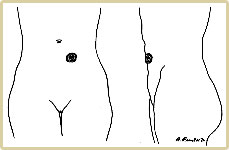Main Office: 972-612-0430
Billing: 214-501-1194
Colon & Rectal Associates of Texas
Ostomy
- What is an ostomy?
 The word "ostomy" is derived from Greek and means a surgically created opening connecting an internal organ to the surface of the body. Different kinds of ostomies are named for the organ involved. The most common types of ostomies in intestinal surgery are an "ileostomy" (connecting the small intestine to the skin) and a "colostomy" (connecting the large intestine to the skin).
The word "ostomy" is derived from Greek and means a surgically created opening connecting an internal organ to the surface of the body. Different kinds of ostomies are named for the organ involved. The most common types of ostomies in intestinal surgery are an "ileostomy" (connecting the small intestine to the skin) and a "colostomy" (connecting the large intestine to the skin).
- An ostomy may be temporary or permanent. A temporary ostomy may be required if the intestinal tract can't be properly prepared for surgery because of blockage by disease or scar tissue. A temporary ostomy may also be created to allow a disease process or operative site to heal without irritation by the passage of stool. Temporary ostomies can usually be reversed with minimal or no loss of intestinal function.
- A permanent ostomy may be required when disease, or its treatment, impairs normal intestinal function, or when the muscles that control the rectum do not work properly or require removal. The most common causes of these conditions are low rectal cancer and inflammatory bowel disease.
- An ostomy may be temporary or permanent. A temporary ostomy may be required if the intestinal tract can't be properly prepared for surgery because of blockage by disease or scar tissue. A temporary ostomy may also be created to allow a disease process or operative site to heal without irritation by the passage of stool. Temporary ostomies can usually be reversed with minimal or no loss of intestinal function.
- How will I control my movements?
- Once your ostomy has been created, your surgeon or an enterostomal therapist or "ET nurse" (a nurse who specializes in ostomy care) will teach you to apply and wear a pouch called an ostomy appliance. The pouch is made of a special form of plastic which is held to the body with an adhesive skin barrier. Many sizes and styles of ostomy pouches are available. The pouch is disposable and is emptied or changed as needed. The system is quite secure; "accidents" are not common, and the pouches are odor-free. The frequency of your bowel movements will vary, depending on the type of ostomy you have, your diet, and your bowel habits prior to surgery. If the ostomy is a colostomy, irrigation techniques may be learned which allow for increased control over the timing of bowel movements.
 The image depicts an ostomy appliance, which is a plastic pouch held to the body with an adhesive skin barrier, that provides secure and odor-free control of bowel movements.
The image depicts an ostomy appliance, which is a plastic pouch held to the body with an adhesive skin barrier, that provides secure and odor-free control of bowel movements.
- Will my physical activities be limited?
- The answer to this question is usually an emphatic NO! You may have friends or acquaintances who have an ostomy of which you are unaware. Public figures, prominent entertainers, and even professional athletes have ostomies that do not significantly limit their activities. All your usual activities, including active sports, may be resumed once healing from surgery is complete.
- Will an ostomy affect my sex life?
- Most patients with ostomies resume their usual sexual activity. In men, removal of the lower rectum for cancer may result in sexual dysfunction due to injury to nerves that pass close to the rectum. This is unrelated to the ostomy. Many people with ostomies worry about how their sexual partner will think of them because of their appliance. This perceived change in one's body image can be overcome by a strong relationship, time and patience. Support groups are also available in many cities. If the surgical procedure will require removal of the rectum, you may wish to discuss sexual function with your colon and rectal surgeon or an ET nurse prior to surgery.
- It is often comforting and reassuring for a patient who is facing a permanent ostomy to visit with another person who has already been through the surgery and adjusted to his or her ostomy. Such visits can often be coordinated by your surgeon or ET nurse.
- If circumstances dictate the need for an ostomy, it is likely that you will return to a fulfilling lifestyle. With the skill and support of a colon and rectal surgeon and ET nurse, one can cope with either a temporary or permanent ostomy and resume a normal life.
- It is often comforting and reassuring for a patient who is facing a permanent ostomy to visit with another person who has already been through the surgery and adjusted to his or her ostomy. Such visits can often be coordinated by your surgeon or ET nurse.
© American Society of Colon and Rectal Surgeons